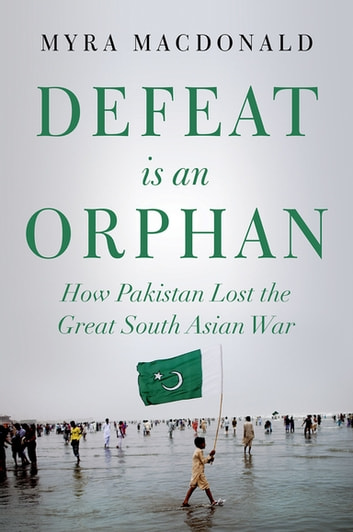The debate of counter-proliferation and counter-terrorism in the age of globalization or twenty-first century have direly influenced Pakistan’s mainstream policies. The leading architectures of national security strategy are trying to address the internal and external security threats while chalking out a comprehensive plan for surviving in the regional crisis or the Great South Asia War. How Pakistan Lost the Great South Asian War is the central argument of a Scottish writer, Myra MacDonald. She is a journalist specialising in regional political and security affairs of South Asia and served Reuters as a corresponding writer for nearly thirty years. While devoting the larger part of her life to studying the various dynamics of Indo Pak rivalry, she attempts to sketch a different picture of New Delhi Islamabad interaction exclusively in post 9/11 and post nuclearized era.
The book contains twelve chapters covering different subjects relevant to the India Pakistan dispute. The behaviour of territorially adjoining nuclear states of South Asia has proved them to be good enemies and bad neighbours in international system. The main theme of the book is Afghanistan and Kashmir in addition to India and Pakistan in a broader notion of South Asian Great War. The debate starts from the hijacking of Indian Airlines Flight IC-814 and ends at the Uri incident of 2016. An Indian inclined prologue and epilogue of the book covers the historical causes of Indo Pak confrontation and its impacts on bordering areas of Afghanistan and Kashmir. The central argument of MacDonald’s study revolves around the contesting nuclearized attributes of both India and Pakistan. The decade-long rivalry between both nuclear armed states Asia portrays a worrisome picture of persistently swelling strategic muscles under inflexible national behaviours, according to MacDonald.
The debate in the book carries several imbalanced arguments. The writer states the acquisition of nuclear weapons provided a false confidence in Pakistan’s security establishment against India (p. 26). In contrast to discussing the nuclear status of Islamabad in the first chapter, she mentions Washington’s recognition of New Delhi as an American ally and a rising power in Asian continent. Such observations of the US provided the American president an apposite opportunity to publically side with India for the first time during the Kargil Crisis (p.64). Chapter three, after outlining the details of Agra Summit parallel to the changing regional dynamics of South after the tragic incident of 9/11, focuses on Afghanistan. New Delhi’s external intelligence agency (RAW) covertly decided to help Afghanistan’s Northern Alliance and Israel’s Mossad (external intelligence agency) by establishing a base at Farkhor on the Afghan Tajik border in 1997. The Indian intelligence agency collaboration was never opened up to parliamentary or public debates (p. 93). Chapter five emphasises upon the American role in nuclearized South Asia and unambiguously mentions President Clinton”s remarks for Indo US friendship as “natural allies” while proclaiming Pakistan as an unnatural ally (p.106). The subsequent chapters continue the discussion over the issues of cross border terrorism, role of non-state actors and their adverse impact on the thinly designed peace initiatives in the presence of extra-regional powers.

During the 2001 2002 Indo-Pak military standoff, the political, military and diplomatic reasons restrained New Delhi from being involved in a major clash with Islamabad. Most importantly, the inadequate armed capabilities, lack of military modernization due to corruption scandals, and politicians involved in taking bribes for purchasing advanced weapons made the BJP’s war fighting leader reluctant to launch an attack against Pakistan (p. 136). While talking about Kashmir, the writer takes the word “Azaadi” in different a connotation freedom from India, independence, support for Pakistan, release from the humiliation of occupation, and an end to violence (p. 151). The interesting detail of Indo Pak peace talks (2004 2007) starts by explaining the interaction of three nuclear powers Washington, New Delhi, and Islamabad. Several initiatives for introducing peace in subcontinent were sabotaged by the Mumbai attack which, according to MacDonald, was caused by Pakistan. In this way, the Great South Asian war is not in Islamabad’s favour because a non-NATO US ally and a front line state in war on terror is facing social unrest, political instability, and economic crisis in a disturbed regional security environment.
The principal argument in the book proclaims Pakistan to be a state allegedly losing the Great South Asian War in which the role of Indo US strategic partnership coupled with unsettled Kashmir issue has created a challenging situation for Islamabad. A wave of multifaceted crisis has surrounded Pakistan by weakening its position in regional politics of South Asia. Therefore, Indian ratcheting and policies for neighbouring states generally, and for Pakistan especially, underestimated Islamabad’s desires for keeping the Indo Pak relations peacefully stable and diplomatically harmonious. A record of half century bilateral wrestling values has always been dominated by Indian regional hegemonic attitude; this fabricated a different strategic environment in the region which is called a Great South Asian War by Myra MacDonald.
The short and comprehensive essays in the book reflect a fascinating record of varying arguments based on empirical data collected from India and Pakistan, Jammu and Kashmir. Additionally, multiple views were collected from other parts of the world which were considered to be an effort to objectively balance the main debate of the book. The book tries to present arguments to identify and realize a contemporary critical standard evaluating Pakistan’s role in regional and global politics.





